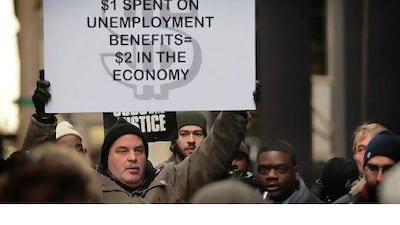Joseph Moscato opened a folder that bulged with more than 100 neatly printed letters. Each one was an application for a job sent last year. Every single one had resulted in a rejection.
"This is about half of them. I have more back at my apartment," explains the former executive assistant at a New York hedge fund as he stands on a Manhattan street and hands out his business card.
Mr Moscato has not worked for more than two years since the financial crisis of late 2008 ripped apart the US economy. Now, a nascent recovery has begun.
Banks are again booming, Wall Street stocks are soaring and economic fundamentals appear on the firmer footing of modest, hesitant growth.
But one key sector of the US economy has proved almost immune to the recovery: unemployment. The official unemployment rate in America still stands at about 9 per cent, representing about 13.7 million people.
But that headline figure fails to take into account the long-term unemployed who have despaired and stopped looking for jobs. It also does not include those forced to take part-time jobs while they are seeking full-time employment.
When those numbers are added, the number of unemployed and under-employed Americans soars to more than 20 million. In California alone there are about 1 million jobless.
The hardest hit are the long-term unemployed known as the "99ers", due to the fact that their benefits have run out after 99 weeks without work.
"I am a classic 99er," says Mr Moscato, a college graduate whose benefits ran out last summer.
Since then he has been surviving on savings and a one-off windfall from an inheritance. When those run out he will have nothing, facing the loss of his home and his ability to buy food and other essentials.
"I laugh when people talk about the recovery. I don't see any sign of it," Mr Moscato says.
In many places, 99ers and other long-term jobless have formed organisations in order to campaign for an extension of their benefits and direct government action to create jobs, as happened during the Great Depression.
But so far, their appeals have fallen mainly on deaf ears.
The Obama administration, under fire from Republican politicians, is instead embarking on a series of spending cuts across government. There is little political appetite for raising benefits or funding major public works programmes.
Yet that has brought intense criticism from some quarters. As the unemployment rate remains stubbornly high, some warn it could undermine the wider recovery in the US economy.
The Nobel Prize-winning economist Paul Krugman penned a column in The New York Timesthis month headlined "How to Kill a Recovery". Mr Krugman warned spending cuts and federal lay-offs would add to the unemployment rate and stymie the current levels of growth.
"We're still near the bottom of a very deep hole but at least we're climbing," he wrote. "It's too bad that so many people, mainly on the political right, want to send us sliding right back down again."
Others have worried that a new sort of US economy will grow out of the recession, one in which high levels of unemployment become politically and economically acceptable. That has social services campaigners worried.
Food banks, which give away donated groceries to the needy, are already warning of the swollen numbers of unemployed using their services.
"It's a jobless crisis," says Mark Dunlea, the associate director of Hunger Action Network in New York. "In the last three years we have had a 60 per cent increase in people coming to us and that is unprecedented."
But none of that means much to Mr Moscato. He just wants a job - any job. He is not alone. Around him on Manhattan's Third Avenue on the Upper East Side are his fellow unemployed.
About 30 unemployed protesters have gathered outside the office of the New York senator Charles Schumer to call for help. They hold placards that bear slogans such as "Full Employment Now!" and "Jobs for all New Yorkers".
Each has their own tragic story of life without work, and often without benefits.
There is Julius Mitchell, 47, from Brooklyn, who lost his job as a clerk 18 months ago. He worries about feeding himself when every dollar and cent is precious.
"It is very stressful," Mr Mitchell says. "You wake up and think maybe I will only eat one slice of pizza all day. I don't know I have lived like this for so long."
Or there is Steve Loren, 47. The former finance worker wore a smart suit and tie to the protest. Mr Loren is lucky as his wife has a job, but life is still hard and he worries he may have to declare himself bankrupt.
"It kills a finance career if that happens," he says.
Those gathered chant and wave their placards on the busy pavement for an hour or so.
But most passers-by ignore it with their heads bowed down, striding past, and the roaring traffic makes it hard for the chants of the demonstrators to be heard.
"I know it might be pointless but it feels good to be doing something," Mr Moscato says.

